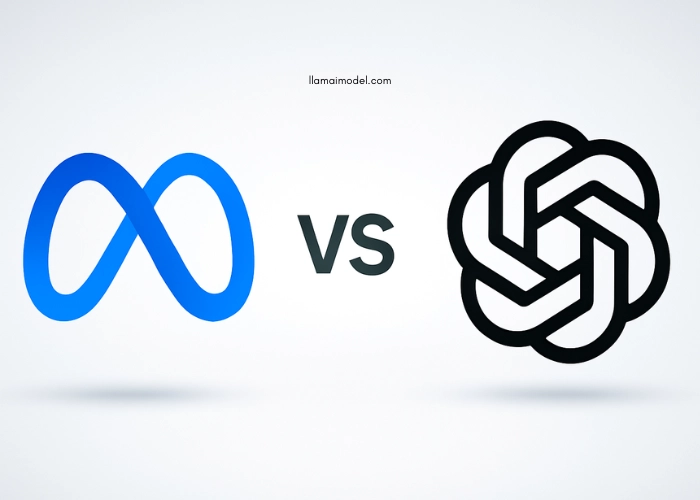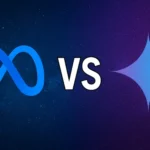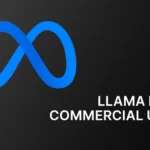In the colossal battle for AI supremacy, the choice between Meta’s Llama and OpenAI’s ChatGPT has become the central question for creators, developers, and businesses. This is more than a simple product comparison; it’s a choice between two fundamentally different philosophies—Meta’s open, flexible ecosystem versus OpenAI’s polished, powerful walled garden. This guide cuts through the noise to provide a definitive, data-driven analysis. We won’t just tell you what they are; we will give you a clear framework to determine which AI titan is unequivocally the right choice for your specific goals in 2025.

Key Takeaways: The Final Verdict in 30 Seconds
- For Customization, Cost & Privacy: Llama is the undisputed champion. Its open-source nature allows for on-premise hosting (total data privacy), deep fine-tuning, and significantly lower operational costs through a competitive API market.
- For Out-of-the-Box Power & Agentic Tasks: ChatGPT and its advanced models currently lead. OpenAI’s ‘o’ series reasoning agents are purpose-built for complex, multi-step problem-solving that foundational models are not yet designed for.
- The Best Foundational Model is Task-Dependent: In a direct Llama 4 vs. GPT-4 matchup, the winner depends on the job. Llama 4 excels at tasks requiring massive context (analyzing books), while the GPT-4 series is a highly refined and reliable all-rounder.
The Core Matchup: Llama 4 vs. GPT-4 Series
This is the true apples-to-apples comparison between the foundational models that power each ecosystem. We are comparing Llama 4 (Maverick & Scout) directly against OpenAI’s non-agentic workhorses, the GPT-4 series (4.1 and 4.5).
Architecture and Raw Capability
The core difference lies in their design philosophy.
- Llama 4 uses a Mixture-of-Experts (MoE) architecture. Think of it as a large firm of specialists. For any given task, only the most relevant experts are activated. This makes it incredibly efficient, allowing for massive models like the 400-billion parameter Llama 4 Maverick to run with the speed and cost of a much smaller model. Its main advantage is a colossal context window, with Llama 4 Scout capable of processing up to 10 million tokens (the equivalent of dozens of books) at once.
- The GPT-4 Series uses a traditional Dense Transformer architecture. Think of this as one brilliant, highly-trained generalist who uses their entire brain for every task. This can result in highly coherent and reliable outputs across a wide range of general tasks, but it is less efficient and has a smaller context window (up to 1 million tokens for GPT-4.1).
Verdict: For tasks involving vast amounts of text analysis, Llama 4 Scout is in a league of its own. For high-quality, general-purpose generation, the GPT-4 series is a proven and formidable competitor.
Use Case Performance: Writing, Summarization, and Data Analysis
- Creative and Technical Writing: This is a dead heat. Both model families are exceptionally capable. The GPT-4 series is often seen as slightly more polished and “safer” in its outputs, while Llama 4 can sometimes produce more novel or unexpected results. The choice often comes down to brand voice and personal preference.
- Summarizing Large Documents: Llama 4 wins, decisively. Its ability to ingest and reason over millions of tokens in a single prompt makes it the superior tool for synthesizing research, analyzing legal discovery, or understanding entire codebases.
- Data Analysis: The GPT-4 series, when paired with the ChatGPT interface’s Code Interpreter, has a slight edge in interactive data analysis where code needs to be generated and executed. However, for analyzing insights from massive, unstructured text datasets, Llama 4 is superior.
The Next Frontier: OpenAI’s Reasoning Agents vs. Llama
It is crucial to understand that OpenAI has a category of models that Meta does not currently have a direct public competitor for: Reasoning Agents.
OpenAI’s ‘o’ Series (o3, o4-mini): These are not just language models. They are “agentic” systems designed to reason and act. They can understand a complex goal, break it down into steps, use tools (like a code interpreter or web browser), and execute a plan to find a solution. This makes them fundamentally different and more powerful for tasks like:
- Complex, multi-file software development.
- Automated market research and report generation.
- Solving advanced scientific or mathematical problems.
Llama’s Position: While Meta does not have a model explicitly branded as a “reasoning agent,” developers can use the powerful Llama 4 models as the “brain” to build their own agentic systems. Llama’s open nature and API compatibility make it a fantastic foundation for creating custom agents, but this requires significant development work.
Verdict: For out-of-the-box agentic capabilities, OpenAI is the clear leader. For building custom, specialized agents, Llama provides the more flexible and cost-effective engine.
The Definitive Comparison Table (2025 Models)
| Attribute | Llama 4 Series | GPT-4 Series | OpenAI ‘o’ Series (Agents) |
|---|---|---|---|
| Primary Goal | Efficient, scalable language processing | High-quality general reasoning | Autonomous, multi-step task execution |
| Best For | Massive context analysis, custom hosting | Reliable all-around performance | Complex problem-solving, automation |
| Can it Run Offline? | Yes (On-premise hosting) | No | No |
| Customization | Deep fine-tuning (code required) | Custom GPTs (no-code) | Tool usage & function calling |
| Typical Cost | Lower (via competitive partner APIs) | Premium | Premium |
| Context Window | Up to 10,000,000 tokens | ~200,000 tokens | ~200,000 tokens |
The Deciding Factors: Cost, Privacy, and Control
For many, the “better” model comes down to these three practical considerations.
- Cost: Llama wins. Due to its open ecosystem, dozens of companies compete to offer Llama API access, driving prices down dramatically. OpenAI operates as a premium, single-provider service, and its API pricing reflects that.
- Privacy: Llama wins, unequivocally. The ability to download Llama and run it on your own servers (on-premise) is the gold standard for data privacy. Your data never has to leave your control. While OpenAI has strong enterprise privacy policies, your data is still processed on their servers.
- Control: Llama wins. The open-source approach gives you full control. You can modify the model, fine-tune it on proprietary data to create a unique competitive advantage, and choose your own infrastructure. ChatGPT offers a polished, controlled experience with limited customization options.
Final Verdict: Llama vs. ChatGPT — Your Decision Framework
There is no single winner, only the right tool for your specific job. Use this framework to make a definitive choice.
You should choose the Llama ecosystem if:
- Data Privacy is Non-Negotiable: You handle sensitive data and need to host the model on-premise.
- Cost is a Key Factor: You are building a scalable application and need the lowest possible cost per API call.
- Your Core Task is Long-Context Analysis: You need to analyze massive documents, books, or codebases.
- You Require Deep Specialization: You plan to heavily fine-tune the model on your own data to create a unique expert system.
You should choose the ChatGPT ecosystem if:
- You Need Top-Tier Agentic Reasoning: Your task requires automated, multi-step problem-solving out-of-the-box.
- Ease of Use is Paramount: You want a polished, reliable product that “just works” with minimal setup.
- You Are Building No-Code Solutions: You want to leverage Custom GPTs for rapid, personalized chatbot creation.
- You Need the Most Proven All-Around Performer for general-purpose tasks and are willing to pay a premium for it.
FREQUENTLY ASKED QUESTIONS (FAQ)
QUESTION: For coding, is Llama 4 or GPT-4 better?
ANSWER: It depends on the task. For analyzing and understanding a large, existing codebase, Llama 4 Scout’s huge context window is superior. For generating novel code, debugging complex issues, or tasks that can be broken into steps, OpenAI’s models—especially the ‘o’ series agents—are often considered more effective.
QUESTION: Is Llama truly free for commercial use?
ANSWER: Llama models are free to download and use commercially, but with important license restrictions. The biggest caveat is that companies with over 700 million monthly active users must request a special license from Meta. Always have your legal team review the full Llama Community License.
QUESTION: What does it mean that Llama is “source-available” but not “open-source”?
ANSWER: True “open-source” licenses (like MIT or Apache 2.0) have minimal restrictions on use. Llama’s license, while making the source code available, includes specific rules in its Acceptable Use Policy and other restrictions (like the one for EU users on multimodal models), which makes it more restrictive than what the Open Source Initiative would certify.
QUESTION: Will Meta release a reasoning agent to compete with OpenAI’s ‘o’ series?
ANSWER: While Meta has not officially announced a direct competitor, the development of models like the unreleased “Llama 4 Behemoth” and their extensive research into AI reasoning strongly suggest they are working on more advanced agentic systems. It is a key area to watch in the ongoing AI race.






